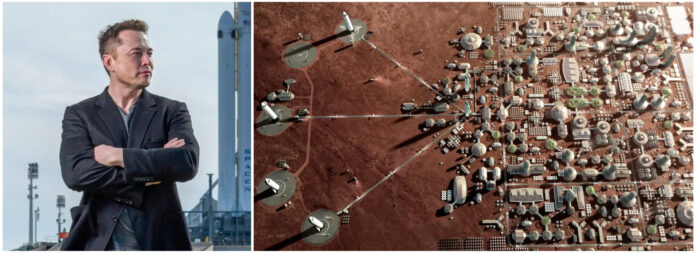Elon Musk, the enigmatic billionaire entrepreneur and founder of SpaceX, has long been vocal about his ambition to establish a human colony on Mars. His vision goes far beyond mere exploration; Musk aims to create a sustainable, self-sufficient settlement capable of supporting up to a million people. This ambitious endeavor, known as the Mars colonization project, represents one of the most audacious undertakings in human history.
The Visionary Plan
At the heart of Musk’s blueprint for Mars colonization is a combination of innovative technology, strategic planning, and unwavering determination. SpaceX, the aerospace company founded by Musk in 2002, has been at the forefront of developing the necessary hardware and infrastructure to make interplanetary travel a reality. Central to this effort is the Starship spacecraft, a fully reusable vehicle designed to transport large numbers of passengers and cargo to Mars and back.
Phased Approach
Musk envisions a phased approach to colonizing Mars, starting with unmanned missions to lay the groundwork for future habitation. These missions will involve sending spacecraft to deliver essential supplies, equipment, and infrastructure to the Martian surface. They will also serve to conduct critical research and reconnaissance, identifying suitable landing sites and assessing the planet’s resources.
Building the Colony
Once the necessary infrastructure is in place, manned missions will follow, gradually building up the colony’s capacity over time. Musk envisions a self-sustaining settlement equipped with habitats, greenhouses, power plants, and manufacturing facilities. Advanced technologies for life support, energy production, and food cultivation will be employed, leveraging the Martian environment to maximize sustainability.
Overcoming Challenges
Establishing a colony on Mars is not without its challenges. The harsh Martian environment, with its thin atmosphere, extreme temperatures, and lack of readily available resources, presents numerous obstacles to overcome. Musk and his team are actively working on solutions to these challenges, from developing advanced life support systems to exploring ways to harness Martian resources such as water and carbon dioxide.
Addressing Concerns
In addition to the technical and logistical challenges, Musk recognizes the importance of addressing the psychological and physiological effects of long-duration space travel and living in a confined, isolated environment. Ensuring the well-being of the colonists, both physically and mentally, throughout their journey and stay on Mars is paramount.
The Significance of Mars Colonization
Beyond the practicalities, Musk’s vision for a million-person colony on Mars raises profound questions about the future of humanity. By expanding our presence beyond Earth, Musk believes we can safeguard against existential threats and ensure the long-term survival of our species. Moreover, the colonization of Mars has the potential to unlock new opportunities for scientific discovery, technological innovation, and economic growth, benefiting not only the inhabitants of Mars but also those on Earth.
Controversy and Criticism
Despite the lofty aspirations of the Mars colonization project, it has not been without its skeptics and critics. Many question the feasibility and practicality of establishing a self-sustaining colony on Mars within the foreseeable future, citing the immense technical, financial, and ethical challenges involved. Others raise concerns about the potential environmental impact of human colonization on Mars and the ethical implications of exploiting another planet for our own benefit.
Conclusion
Despite the challenges and uncertainties, Elon Musk remains undeterred in his pursuit of colonizing Mars. With SpaceX leading the charge and a growing community of supporters and enthusiasts rallying behind him, Musk’s vision continues to inspire and captivate the imagination of people around the world. Whether or not Musk succeeds in establishing a million-person colony on Mars remains to be seen, but one thing is certain: the journey towards that goal will push the boundaries of human ingenuity, ambition, and exploration like never before.

























